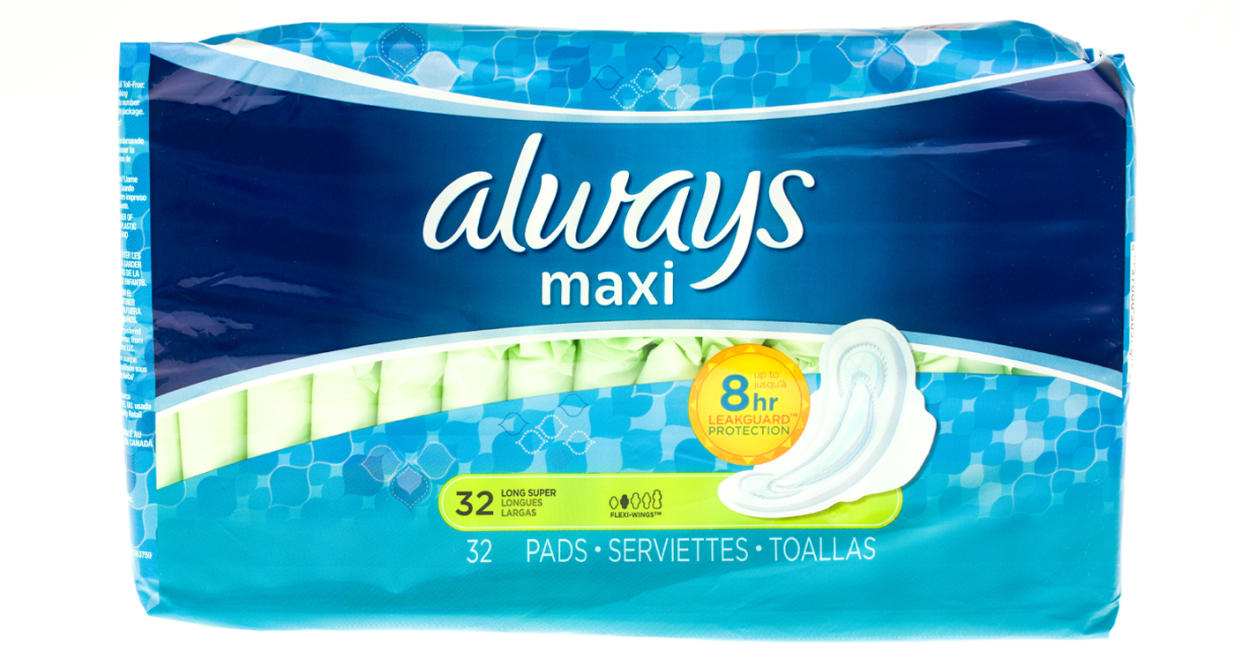Here’s why Always removing the female symbol from its menstrual pads is so controversial

Always is removing the female symbol from its menstrual products’ packaging to be more inclusive of transgender and non-binary costumers — and people have strong feelings about it.
In a statement provided to Yahoo Lifestyle, a spokesperson for Always said: “For over 35 years Always has championed girls and women, and we will continue to do so. We’re also committed to diversity and inclusion and are on a continual journey to understand the needs of all of our consumers. We routinely assess our products, packaging, and designs, taking into account a variety of inputs including in depth consumer research, to ensure we are meeting the needs of everyone who uses our products. The change to our pad wrapper design is consistent with that practice.”
The Procter and Gamble brand reportedly decided to remove the feminine Venus symbol from the wrapper that goes around individual sanitary pads after transgender activists, including Ben Saunders, reached out to Always in the summer. They asked Always to make the change, explaining that there are transgender men who still get their periods.
Always responded by making the design change, which will take effect in 2020. In the statement provided to Yahoo Lifestyle, though, Always pointed out that the packaging design is “updated regularly” and the new design “does not impact the outer packaging/box or brand visual identity.”
tw// periods
hi @Always i understand that you guys love girl positivity but please understand that there are trans men that get periods, and if you could please do something about the ♀?symbol on your pad packaging, i’d be happy. i’d hate to have any trans males feel dysphoric.— jocelyn ? (@phiddies) October 13, 2019
Several have applauded the decision.
“I think it's a remarkably progressive, inclusive and savvy thing to do for what is surely a relatively small, trans masculine segment of their consumer base,” Jenn Burleton, program director of the TransActive Gender Project at Lewis & Clark Graduate School of Education and Counseling in Portland, Ore., tells Yahoo Lifestyle.
Burleton adds, “In general, it demonstrates growing awareness that the marketing of products should be focused on what the product does for a consumer, rather than designating — through packaging or text — which gender role the product is appropriate for.”
Paula Neira, clinical program director for the Johns Hopkins Center for Transgender Health, agrees, telling Yahoo Lifestyle, “I think this is a move to demonstrate inclusion, and it reflects the reality that the population that needs the products is more than just folks that identify as female. It’s more inclusive recognizing that transgender males or nonbinary individuals may still need the products.”
#Always when I got my first period in 1985, there just happened to be a sample of your brand new product delivered a few days prior. I’ve been brand loyal ever since and I applaud your gesture of inclusivity. ??
— Stephane (@stepiphany) October 23, 2019
But not everyone is a fan of the change. Some critics are saying removing the female symbol goes too far, describing it as an “attack on women” and evidence that women are “literally being erased.” Others are promising to boycott Always products. One outspoken critic, feminist journalist Julie Bindel, penned an op-end for the U.K.’s Telegraph, writing: “The likes of Always should not cave in to trans activists, but rather should recognize that the people boosting their profits and using their product are women — and only women.”
Bindel also tweeted: “By caving into trans activists, Always have eliminated women.”
Both Burleton and Neira have a response to people who say this design change “erases” women. "To those who say that changing graphics on menstrual hygiene products 'erases women,' I say you have a very superficial understanding of the ways in which women are both visible, affirmed and empowered in the world,” says Burleton.
Adds Neira, “The removal of the female symbol on the products doesn’t erase half the people on the planet that identify as female.”
The article about @Always changing their packaging has me FUMING. Are women invisible? Changing the packaging to suit trans/non binary but what about everyone else? Bring out a smaller section to suit the minority, don’t change it all🙄 #always
— Hollie Langsworthy (@HolliexMay) October 20, 2019
Burleton says that it’s also not necessary to explicitly market these products to women. “We don't need stereotypical representations of the female body or pink packaging to determine that a product or service may be useful to us,” she says. “Women will not be erased; however, the attempt to marginalize and oppress women is happening in the patriarchal halls of Congress and the White House, not in the hygiene products aisle at the supermarket."
Others are calling out the fact that most people likely would not have noticed the change if it hadn’t been pointed out:
To everyone pressed about trans men and non binary inclusion:
please tell us... without looking, where the female symbol even was since it’s so important to you #Always— Saint Hall (@IAMSAINTHALL) October 23, 2019
Question: Of those who are so upset that #Always is changing the look it's packaging, how many of you paid attention to it before the announcement? And did you know they have changed it numerous times before?
— An Ambivert🙂 (@OUTSPOKEN_DIVA) October 23, 2019
Y’all know intersex people menstruate right. Y’all know these pads are often used for people with various issues and medical conditions. It’s just a symbol on a product that was only there because of a marketing mockup. Calm down. #Always
— Miracle (@MiujizaMilagro) October 23, 2019
Neira notes that, with more than seven billion people on the planet, “there are a couple that might get offended, but that “doing something that helps people and literally harms no one is an overall positive thing.”
Read more from Yahoo Lifestyle:
Follow us on Instagram, Facebook and Twitter for nonstop inspiration delivered fresh to your feed, every day.

